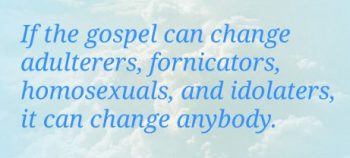I have often said that my approach to God’s word has always been in trying to follow the logic behind his plan. That is the main reason I love the apostle Paul so much, because he presents the nature of God and Jesus in a logical and organized way. He focuses on salvation as a gift from God, by way of our Lord Jesus Christ. His letter to the Christians of the church in Rome explicitly lays out God’s plan, which includes accepting Jesus as our personal Savior. Christ, through his sacrificial death, paid for the sins of both Jews and Gentiles.
In the beginning of Paul’s Epistle to the Romans, he implies that his message was a stumbling-block to the Jews and only foolishness to the Gentiles. “But its inherent glory, as God’s life-giving message to a dying world, so filled his soul, that, like his blessed Master, he despised the shame.”1 This is why he said the following.
I am obligated both to Greeks and non-Greeks, both to the wise and the foolish. That is why I am so eager to preach the gospel also to you who are in Rome. For I am not ashamed of the gospel, because it is the power of God that brings salvation to everyone who believes: first to the Jew, then to the Gentile. For in the gospel the righteousness of God is revealed—a righteousness that is by faith from first to last, just as it is written:2 “The righteous will live by faith” (Romans 1:14-17, NIV).
 Basically, Paul was stating, “I am ready to preach at Rome, for, though I might seem to be deterred by the contempt in which the Gospel is held, and by the prospect of my own humiliation as its preacher, I am not ashamed of it.”3 This suggests that Paul is aware of the world’s opinion and that his declaration shows the world is under judgement, but he offers a remedy that restores righteousness to the believer.4
Basically, Paul was stating, “I am ready to preach at Rome, for, though I might seem to be deterred by the contempt in which the Gospel is held, and by the prospect of my own humiliation as its preacher, I am not ashamed of it.”3 This suggests that Paul is aware of the world’s opinion and that his declaration shows the world is under judgement, but he offers a remedy that restores righteousness to the believer.4
This Gospel that Paul was teaching had a power behind it, which he observed as it reached the hearts of Jew and Gentile alike. It was leading men and women to change their lives and leave their sinful ways. If the gospel can change adulterers, fornicators, homosexuals, and idolaters, it can change anybody.5
I Was Once Ashamed
I must admit that many decades ago, when I first learned about the Gospel of Jesus and God’s overall plan for humanity and the hope this knowledge could bring to everyone, I was hesitant to tell others about it. First, most of my friends and fellow students were atheists, so I was ashamed to admit I was reading and studying the Bible. I was ashamed and afraid that they would think less of me. Besides, I still had some doubts in addition to a lack of confidence and experience in relating my new knowledge to others, and my failures brought despair. It took some courage to overcome this problem.
 In the beginning, I found it best to just explain that I was a new Christian and didn’t have an extensive knowledge of the subject, but I enjoyed sharing what I did know. That immediately relieved much of the pressure. As I learned more, there was more to share. The more I learned the more my doubts dissipated, and my confidence developed as my experience grew. It is like beginning a new job, the longer you work at it, the easier it becomes. Even today, although preaching is much easier, I feel I am still learning, that is why when someone asks about my current occupation, I usually say I am just a student of the Bible and I write about what I learn.
In the beginning, I found it best to just explain that I was a new Christian and didn’t have an extensive knowledge of the subject, but I enjoyed sharing what I did know. That immediately relieved much of the pressure. As I learned more, there was more to share. The more I learned the more my doubts dissipated, and my confidence developed as my experience grew. It is like beginning a new job, the longer you work at it, the easier it becomes. Even today, although preaching is much easier, I feel I am still learning, that is why when someone asks about my current occupation, I usually say I am just a student of the Bible and I write about what I learn.
For others, there may be completely different reasons for their shame, humiliation, or embarrassment. Many people look upon religion as dependence upon a make-believe god figure and that it is a sign of weakness or of lesser intelligence, therefore the believer doesn’t want to admit it. That is one kind of shame, but there are others. It may not be a direct shame of the Gospel itself, but shame of something they did or feel which indirectly prevents them from spreading the Good News of Jesus Christ.
A Christian minister once told me that his hang-up in the beginning was that he couldn’t shake the shame of his own sinful background. No one publically knew about it, but he did and it was a barrier to teaching others about the sins that he, himself, had committed. He handled his problem by admitting his earlier errors. He didn’t make a public confession and list all his improprieties from the pulpit, but he was willing to share pieces of his previous sinful nature as examples, when teaching on a particular biblical topic. Letting others know that you have faced the problems that they are now facing lets them know you really understand and care. They will recognize that if you turned your life around, then they can, too. He used his shame as a tool to teach and preach.
Another person I knew thought she wasn’t good enough to speak about Jesus and his birth, life, death, and resurrection. All her life she was told she wasn’t good enough at anything and that she was stupid, ugly, and would never amount to much. Today she does teach about God’s gift of salvation to this dying world and she is a highly respected preacher.
The apostle Timothy, counseled by his mentor, Paul, was very devoted to preaching about Jesus, but “was known to be a reluctant leader who was often timid and fearful.” Besides, Timothy was sickly at times and was very young and inexperienced for his position of influence early in his ministry.6 There are some commentators that disagree with Timothy’s various defects, citing that they are only inferred, rather than addressed directly,7 but, Paul’s second letter to Timothy did offer him encouragement.
 We do not know exactly why he needed prodding, only that Paul gave it. His advice, even as he sat in prison because of his preaching, was, “Do not be ashamed, then, of the testimony about our Lord or of me his prisoner, but join with me in suffering for the gospel, relying on the power of God” (2 Timothy 1:8, NRSV). “The aged apostle wanted to strengthen the courage of his young colleague.”8
We do not know exactly why he needed prodding, only that Paul gave it. His advice, even as he sat in prison because of his preaching, was, “Do not be ashamed, then, of the testimony about our Lord or of me his prisoner, but join with me in suffering for the gospel, relying on the power of God” (2 Timothy 1:8, NRSV). “The aged apostle wanted to strengthen the courage of his young colleague.”8
Paul knew, from his own experiences, that when he was fearful of sharing the Gospel, he must remind himself that he once followed the way of the world and it is the devil that nudges us to satisfy the desires of the body and mind. Satan is the god of this world and our mission, sometimes, seems to have many more failures than wins. “Satan, who is the god of this world, has blinded the minds of those who don’t believe,” (2 Corinthians 4:4, NLT).
So our fight is not really with humans that look upon us with disapproval, but with Satan, “for we are not fighting against flesh-and-blood enemies, but against evil rulers and authorities of the unseen world, against mighty powers in this dark world, and against evil spirits in the heavenly places,” (Ephesians 6:12, NLT). The summary of Pauline theology is that the righteous must live by faith, because while still in this world, we will continually be tempted to be ashamed.9
These people, I included, are (or were) all thankful for the mercy Jesus has shown and the very life he gave for us — we want to stand-up for Jesus. Although ridiculed and mocked by people in our lives, we are willing to give to him, because of all he gave to us.
What is your shame?
 What is your shame? Were you an adulterer or fornicator? Were you embarrassed for being an idolater who worshiped another god, sports figure, entertainer, movie star, music celebrity, or maybe even money? Were you short tempered and controlling — a mean person? Were you a thief? Those things may be part of your history, but they are not who you are today. Remember, you can’t drive straight down the road of life, if you only have your eyes fixed on the rear view mirror. You can let your past life be a teaching tool, just don’t linger by dwelling on the past or let it become a road block.10
What is your shame? Were you an adulterer or fornicator? Were you embarrassed for being an idolater who worshiped another god, sports figure, entertainer, movie star, music celebrity, or maybe even money? Were you short tempered and controlling — a mean person? Were you a thief? Those things may be part of your history, but they are not who you are today. Remember, you can’t drive straight down the road of life, if you only have your eyes fixed on the rear view mirror. You can let your past life be a teaching tool, just don’t linger by dwelling on the past or let it become a road block.10
Do you still have some doubts about God or Jesus? Is it your family that is holding you back from spreading the Gospel of Jesus Christ? Are you worried or fearful that people will think less of you for being a believer — that your friends and colleagues will think you are some weird mentally unbalanced crazy person? This is the group I came from; back in the 1960s and 1970s, we were called ‘Jesus freaks’.
Just remember that everyone is a sinner, but as a Christian your past transgressions have been forgiven. What you have done and where you have come from, make you who you are today. It is where you are headed that counts, now. Since you have been forgiven, learn more about God and Jesus and their plan of salvation and share it with others. Don’t be ashamed of the Gospel and don’t make Jesus ashamed of you. “Whoever is ashamed of me and my words, the Son of Man will be ashamed of them when he comes in his glory and in the glory of the Father and of the holy angels” (Luke 9:26, NIV).
There is a beautiful Gospel song, “I’m not ashamed of the Gospel,” that brings tears to my eyes. Selected lyrics are listed below and you can find a link to a video by singer Janet Paschal (see References & Notes at the end of this article).11
 We’ve been ridiculed by those who don’t know him,
We’ve been ridiculed by those who don’t know him,
Sometimes we’re mocked by those who don’t believe,
Still I love standing up for my Jesus,
‘Cause of all that he’s done for me.
No, I am not afraid to be counted,
But I’m willing to give my life.
See I’m ready to be
All he wants me to be,
That’s why I am not ashamed of the Gospel,
The Gospel of Jesus Christ.
It is unpopular to associate with Jesus.
Author Chris Patton, wrote, “In today’s culture, it is becoming increasingly unpopular to claim association with the name of Jesus. If we feel any shame, guilt, or disgrace at associating with Jesus, we are guilty. Worse, if we are restrained because of anticipated shame, we are guilty.” He went on to state three responsibilities all Christians must have: (1) remain faithful, (2) share in suffering, and (3) preach the Gospel.12
You don’t have to stand on a podium in front of hundreds of people to teach the Gospel. If you have a fear of public speaking, the Good News works very well being shared on a one-by-one basis. Do you stutter and fumble when speaking about the Gospel? Then maybe you could write about it — use your Facebook page or tweet encouraging messages or write a poem reflecting your love and praise for Jesus. Are you unsure of what to say? Pray for God’s spirit to be upon you as you proclaim and defend the Gospel and you will receive help in what to say (Luke 12:12). If you love Jesus for what he is doing for you, do something for him.
I am not ashamed of the Gospel of Jesus Christ; I enjoy talking about God’s divine plan and sharing my knowledge and thoughts. I don’t believe in ‘cramming the Gospel down anyone’s throat’, but I am not hesitant in preaching or teaching about it. So, I am not ashamed of the Gospel and I don’t want Jesus to be ashamed of me — how about you?
![]()
Copyright © 2019, Dr. Ray Hermann
OutlawBibleStudent.org
➔ Leave comments at the end, after References & Notes.
Your email address will NOT be published. OBS respects your privacy and is compliant with the European Union GDPR regulation.
References & Notes
- Jamieson, Robert, et al., Commentary Critical and Explanatory on the Whole Bible, (Oak Harbor, WA: Logos Research Systems, Inc., 1997), vol. 2, p. 224.
- “The righteous will live by faith” (Romans 1:17) is a scripture quote from the Old Testament at Habakkuk 2:4.
- Vincent, Marvin Richardson, Word Studies in the New Testament, (New York: Charles Scribner’s Sons, 1887), vol. 3, p. 8–9.
- Gruenler, Royce Gordon, “Romans,” in Evangelical Commentary on the Bible, Baker Reference Library, (Grand Rapids, MI: Baker Book House, 1995), vol. 3, p. 929.
- Smith, Jason, “Are You Ashamed of the Gospel?” (Sermon Central, 25 September 2013), https://www.sermoncentral.com/sermons/are-you-ashamed-of-the-gospel-jason-smith-sermon-on-gospel-179384?page=1&wc=800
- Pope, Grayson, “Are You Ashamed of the Gospel? (Gospel-Centered Discipleship, GCD, 15 May 2018), https://gcdiscipleship.com/article-feed/2018/05/15/are-you-ashamed-of-the-gospel
- Rutherfurd, John “Timothy,” James Orr, et al., (Eds.), The International Standard Bible Encyclopaedia, (Chicago: The Howard-Severance Company, 1915), p. 2985.
- Dockery, David S., (Ed.), Holman Bible Handbook, (Nashville, TN: Holman Bible Publishers, 1992), p. 740.
- Ibid., p. 677.
- Hermann, Ray, “Looking at Life Through a Rear View Mirror,” (The Outlaw Bible Student, OBS, 27 January 2018), https://outlawbiblestudent.org/looking-at-life-through-a-rear-view-mirror/
- Song: ‘I’m not ashamed of the Gospel”; Artist: Janet Paschal, (recorded at Dominion Camp Meeting, 1990), — VIDEO, https://www.youtube.com/watch?v=C3cZVLb4hwQ
- Patton, Chris, “Are You Ashamed of Jesus?” (Christian Faith at Work, 5 October 2016), https://www.christianfaithatwork.com/ashamed-jesus/

2 thoughts on “I am Not Ashamed of the Gospel of Jesus Christ — Are You?”